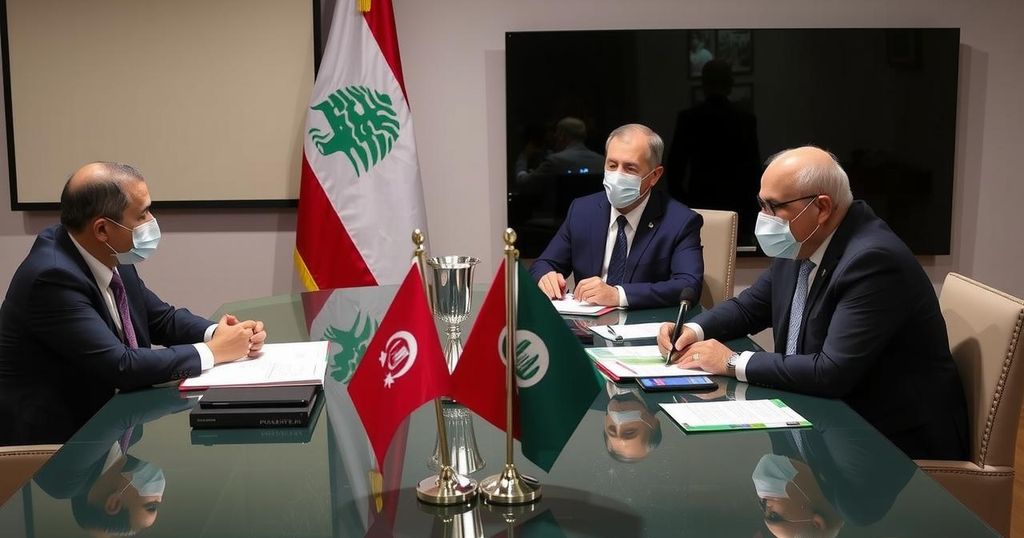Lebanon Political Leaders Gather for Presidential Election Talks

Lebanese leaders are negotiating ahead of a critical parliamentary vote for the presidency, amidst ongoing political fragmentation and a backdrop of economic crisis. Army Chief Joseph Aoun is seen as the leading candidate, although hesitance abounds among factions regarding his nomination. Significant international pressure exists to elect a president to lead reforms, with hopes that the current session will resolve the lengthy political impasse.
On Wednesday, Lebanese political leaders convened for discussions concerning a new presidential election, scheduled just ahead of a parliamentary session. Despite the diminished influence of Hezbollah due to recent conflicts, the path to achieving a united consensus remains complicated. Lebanon has experienced over two years without a president, highlighting the acute political and economic crises affecting the nation. Army Chief Joseph Aoun is considered the frontrunner, with advocates suggesting his leadership could facilitate the rapid deployment of military forces in southern Lebanon after Hezbollah’s mandated withdrawal from border regions, per the November 27 ceasefire agreement with Israel.
However, despite his apparent popularity among certain factions, hesitancy still exists among various political players regarding their support for Aoun amidst ongoing negotiations. Historical divisions rooted in past civil strife often prevent a cohesive agreement necessary for a successful parliamentary vote. The recent war has weakened Hezbollah, creating an environment wherein external influences are urging Lebanese lawmakers to identify a leader.
French envoy Jean-Yves Le Drian, present in Lebanon, pressed the urgency of electing a president to effectively revitalize the nation’s institutions. Concurrently, U.S. envoy Amos Hochstein also encouraged Lebanese leaders to seize the opportunity for political consensus due to the current truce. Insightful observations suggest that Joseph Aoun’s backing stems from the United States, as well as support from France and Saudi Arabia. Despite these potential alliances, internal dissent persists, with significant figures expressing reservations about Aoun’s candidacy, including members of the Hezbollah-affiliated bloc and the Free Patriotic Movement led by Gebran Bassil, son-in-law of former president Michel Aoun.
Other candidates have surfaced in conversations, such as Samir Geagea lead of the Lebanese Forces, former finance minister Jihad Azour, and acting security chief Elias Baissari, reportedly favored by parliamentary speaker Nabih Berri. Complicating matters further, accusations against Hezbollah for obstructing prior election efforts have surfaced, intensifying skepticism around the group’s capacity to influence the selection of a viable candidate. Nevertheless, the Lebanese populace yearns for a functioning presidency, hoping this election will reflect their collective desire rather than foreign or internal political machinations.
Lebanon has been engulfed in a prolonged political and economic crisis following the financial downturn that began in 2019, leading to the absence of a presidential figure since former President Michel Aoun’s term ended in October 2022. The power vacuum symbolizes deeper divisions within Lebanese politics, particularly between the Shiite group Hezbollah and other political factions. Amidst this tumult, the army’s leadership under Joseph Aoun has garnered attention, especially considering his potential to manage sensitive military deployments at the southern border as Hezbollah retracts its presence. The geopolitical dynamics involving international stakeholders like France, the U.S., and Saudi Arabia reflect the complexity of the situation, as external pressure coalesces with local political considerations to guide Lebanon toward electing a new leader.
The ongoing discussions among Lebanese leaders regarding the presidential election reveal the intricate dynamics at play in navigating the politically fragmented landscape of Lebanon. As Joseph Aoun emerges as a potential candidate, challenges remain regarding securing broad-based support amidst historical political divisions. International entities continue to advocate for a unified approach to electing a new president, yet local factions exhibit reluctance, hindered by past grievances and mistrust. Ultimately, Lebanon’s future governance hinges not only on electoral outcomes but the ability of its leaders to foster cooperation in these challenging times.
Original Source: www.barrons.com








